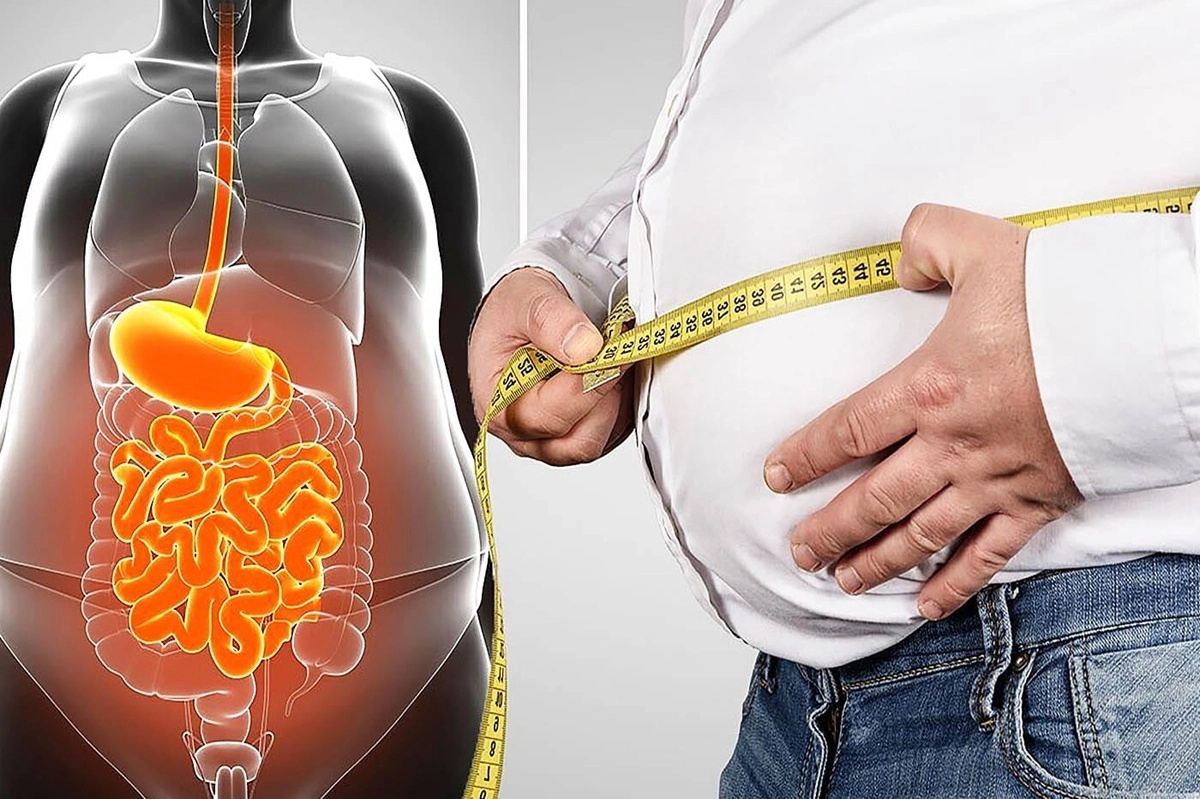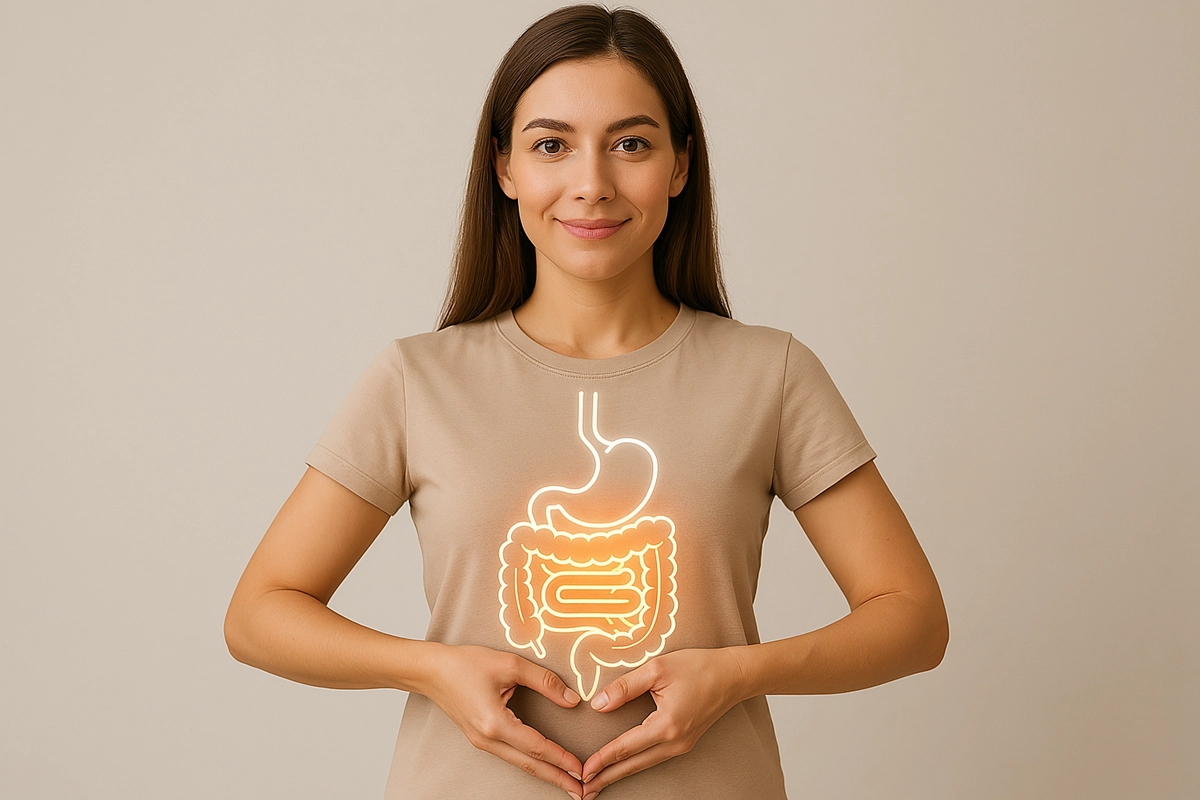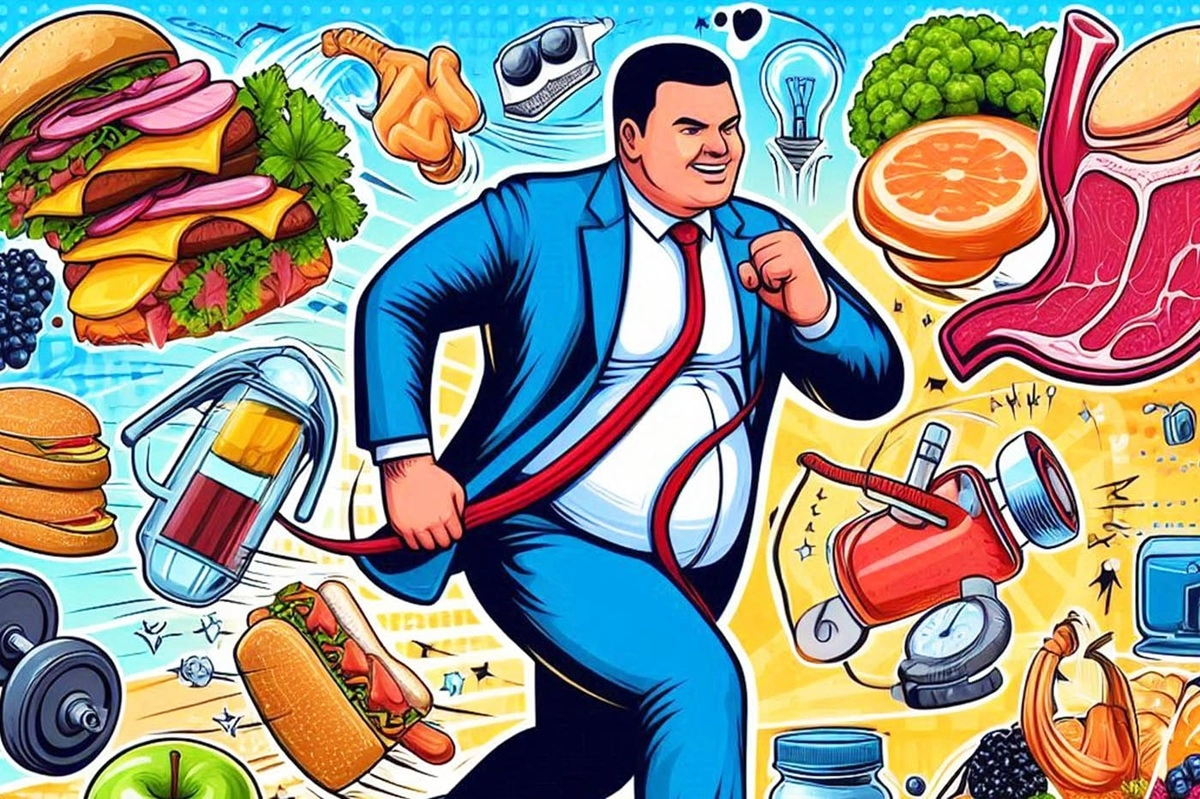If you’ve been struggling with those stubborn extra pounds, you’re not alone in seeking effective alternatives to intermittent fasting.
You’ll discover that sustainable weight loss comes down to making smart, long-term changes to your daily habits, much like Arnold’s methodical approach to bodybuilding. By focusing on proven strategies that don’t require restricting your eating window, you can achieve your fitness goals while maintaining a lifestyle that works for you.
Let’s explore the practical methods that actually deliver results.
What Is the Easiest Way to Lose Weight Naturally?
When it comes to natural weight loss, the most straightforward approach involves creating a sustainable caloric deficit through a combination of diet and exercise.
You’ll find success by making gradual lifestyle changes rather than following extreme diets. Start by replacing processed foods with whole foods, such as fruits, vegetables, lean proteins, and whole grains.
Add moderate activity to your daily routine – even Arnold started with basic movements before becoming Mr. Olympia.
Here’s your simple action plan:
- Fill half your plate with vegetables at each meal
- Walk for 30 minutes daily
- Drink water instead of sugary beverages
- Choose healthy foods that you actually enjoy
- Add physical activity that feels sustainable
Remember: lasting weight loss isn’t about quick fixes. It’s about building healthy eating habits you can maintain for life, just like Arnold’s famous “stay hungry” mindset.
1. Add Protein to Your Diet
Building on those foundational healthy habits, let’s focus on the powerhouse nutrient that’ll transform your weight loss journey – protein.
When you increase your protein intake, you’re giving your body a metabolic boost. Your body actually burns more calories digesting protein than it does other nutrients.
Plus, a high-protein diet helps you feel fuller longer, naturally reducing your appetite and the total calories you consume each day.
Start your day with protein-rich foods, such as eggs, to help kickstart your metabolism.
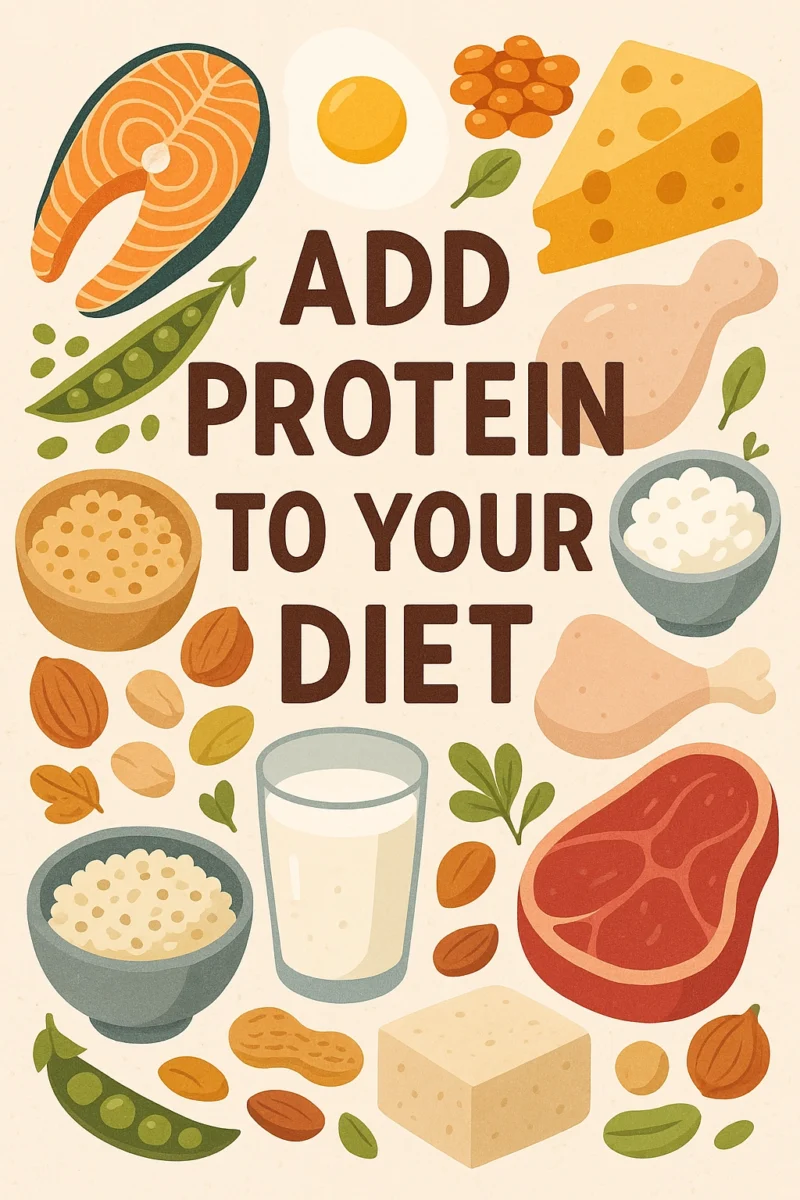
You’ll notice you’re less likely to overeat throughout the day, making it easier to maintain a caloric deficit and burn body fat.
Think of protein as your weight loss ally – it’s working around the clock to help you reach your goals while preserving lean muscle mass.
2. Prioritize Whole, Single-Ingredient Foods
Since your body thrives on simple, unprocessed ingredients, making whole foods the foundation of your diet is essential for sustainable weight loss. By choosing single-ingredient foods over processed alternatives, you’ll naturally reduce your intake of added sugars and unhealthy fats that can derail your weight-loss program.
Whole foods offer significant health benefits that processed foods and meal replacement products can’t match. They’re naturally filling, which helps you stay within your calorie limits without feeling deprived.
You’ll also avoid many health risks associated with heavily processed foods, such as inflammation and blood sugar spikes.
To maximize results, focus on:
- Fresh fruits and vegetables
- Lean proteins
- Whole grains
- Nuts and seeds
- Legumes
These nutrient-dense options will fuel your body efficiently while supporting your weight loss goals.
3. Limit Processed Foods
Although it’s not always easy to resist temptation, reducing your intake of processed foods is essential for achieving successful weight loss. These products are typically loaded with added sugars and excessive calories that can derail your fitness goals.
What makes them particularly challenging is their ability to trigger addictive eating habits, making portion control difficult.
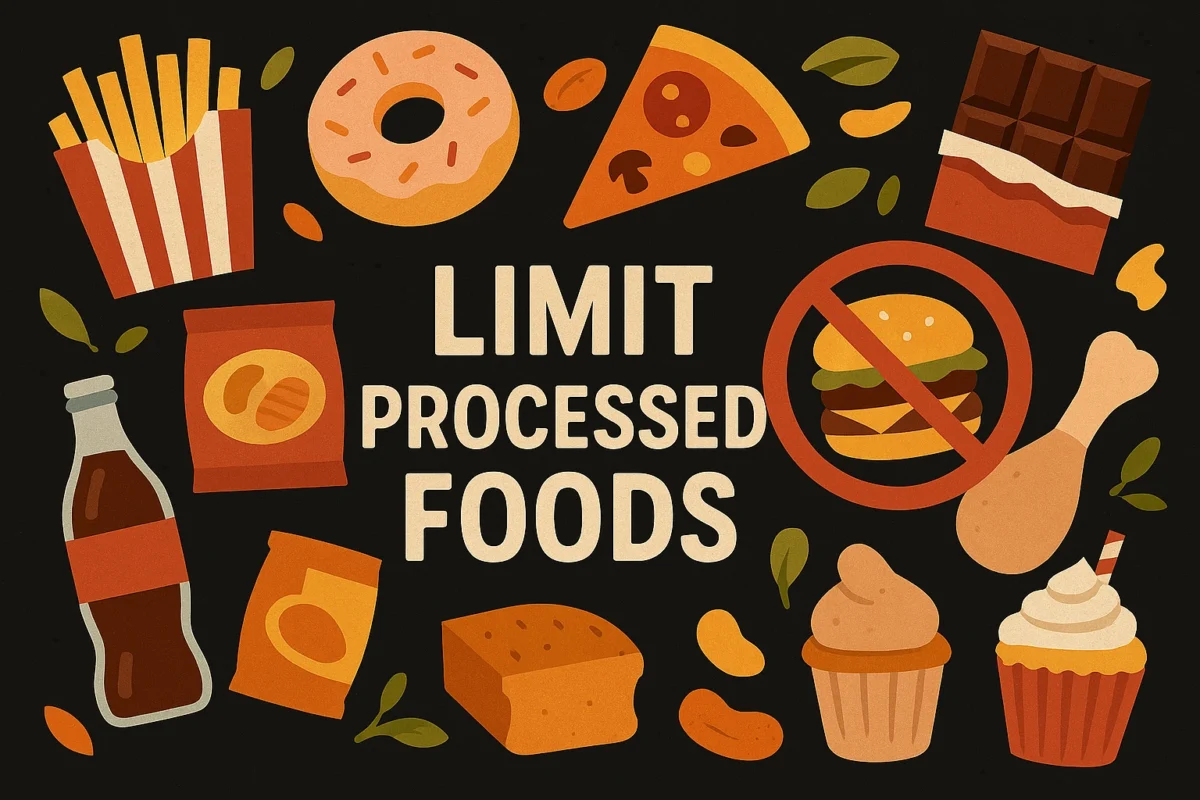
To make smart food choices, start by revamping your healthy eating shopping strategy:
- Read ingredient labels carefully
- Shop primarily along the store’s perimeter, where fresh foods are located
- Prepare meals at home using whole ingredients
- Keep processed snacks out of your home
- Plan your meals to avoid convenience food temptations
4. Stock up on Nutritious Foods and Snacks
The contents of your kitchen can make or break your weight loss journey. Research shows that stocking your home with nutrient-dense food directly influences your eating habits and weight management success. By making wise food choices now, you’re setting yourself up for better decisions in the future.
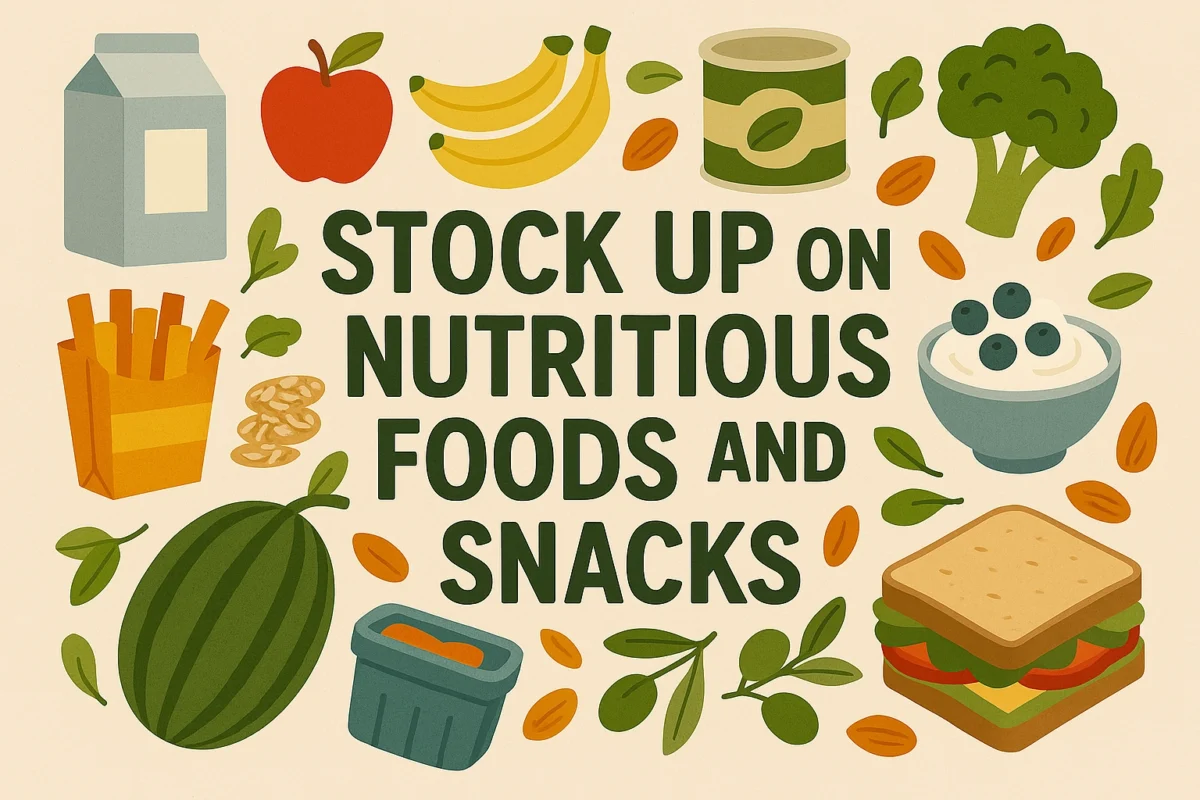
Make it easier to stick to your healthy weight pyramid by keeping these grab-and-go options ready:
- Fresh whole fruits
- Pre-cut vegetables
- Mixed nuts
- Hard-boiled eggs
- Plain yogurt
- Plant-based foods
Any registered dietitian will tell you that maintaining a food and beverage diary while surrounding yourself with nutritious options is a winning strategy.
When you’re hungry and pressed for time, you’ll reach for what’s convenient – make sure those convenient choices support your goals.
5. Limit Your Intake of Added Sugar
Added sugars lurk in countless processed foods and can sabotage your weight loss efforts before you even realize it. The average American consumes approximately 17 teaspoons of sugar daily, often unknowingly through processed foods.
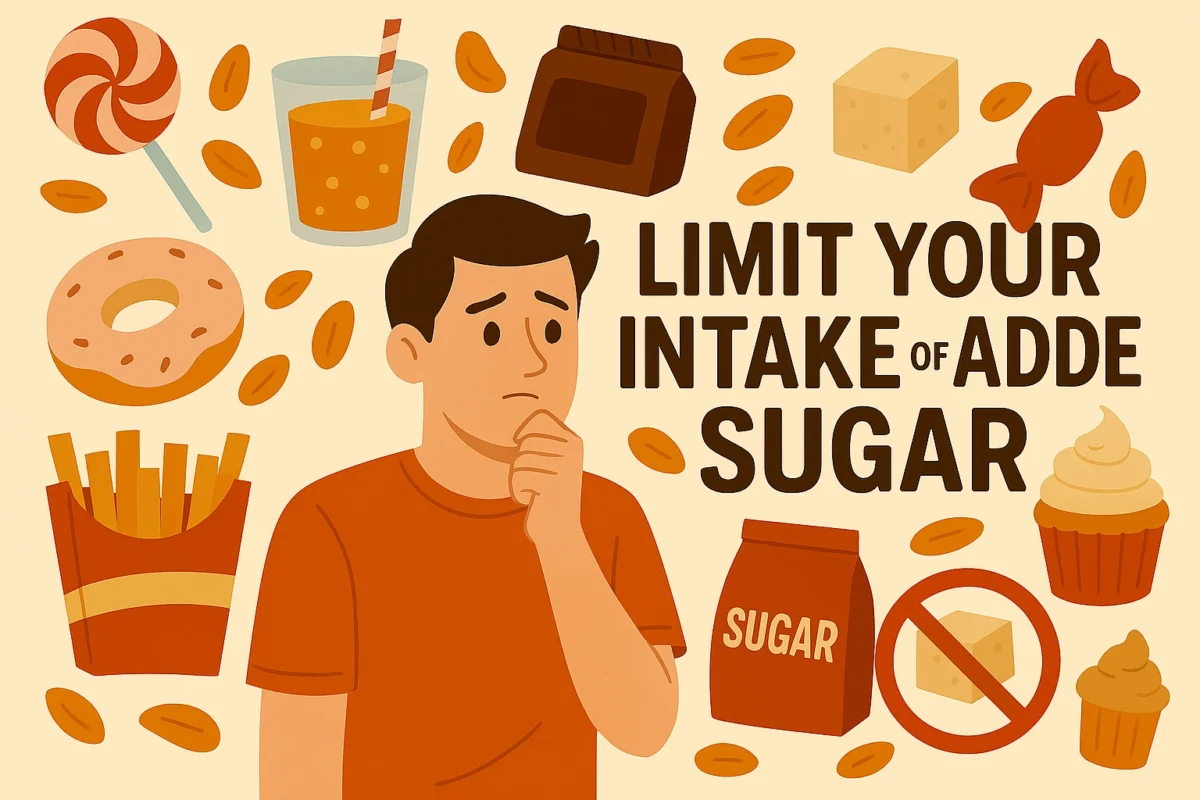
To maintain effective weight management:
- Read food labels carefully, watching for different names of added sugar
- Track your sugar intake using a food diary
- Choose foods with high nutritional value instead of empty calories
- Consult a health care professional about your sugar consumption goals
6. Drink Water
Staying hydrated with water provides one of the simplest yet most effective strategies for sustainable weight loss. When you drink water before meals, especially 30-120 minutes prior, you’ll naturally consume smaller portion sizes during your low-calorie diet plan.
Make water your primary beverage choice, replacing sugary drinks that can sabotage your weight loss plan. As Arnold always says, “Water is the foundation of any serious fitness regimen.”
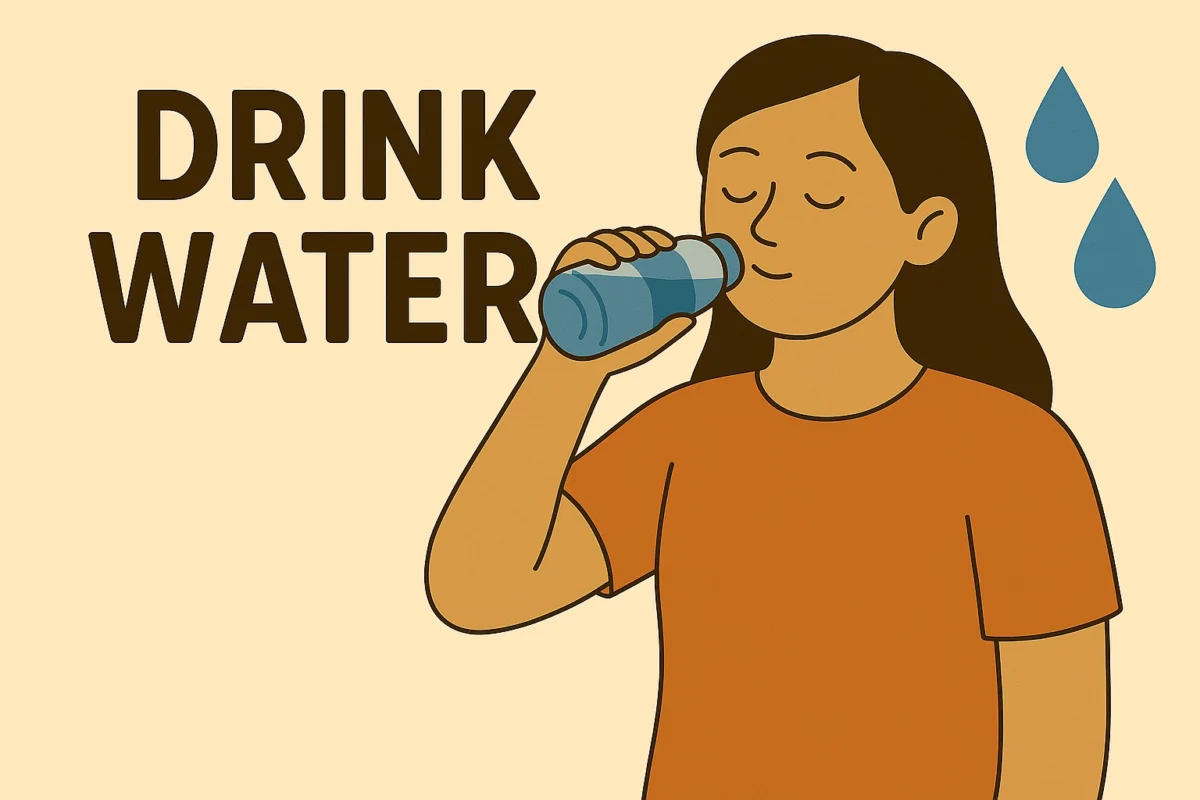
Here’s how to optimize your hydration strategy:
- Drink a glass of water 30 minutes before each meal
- Replace sodas and sweetened beverages with water
- Keep a reusable water bottle with you throughout the day
- Consult your health care provider about your ideal daily water intake based on your activity level and climate
7. Drink Unsweetened Coffee
When consumed black and unsweetened, coffee becomes a powerful ally in your weight loss journey, offering both metabolic benefits and appetite control.
The caffeine in coffee naturally boosts your energy levels, helping you burn more calories throughout the day. You’ll feel more motivated to exercise and stay active, just like Arnold’s famous morning coffee ritual before his legendary gym sessions.
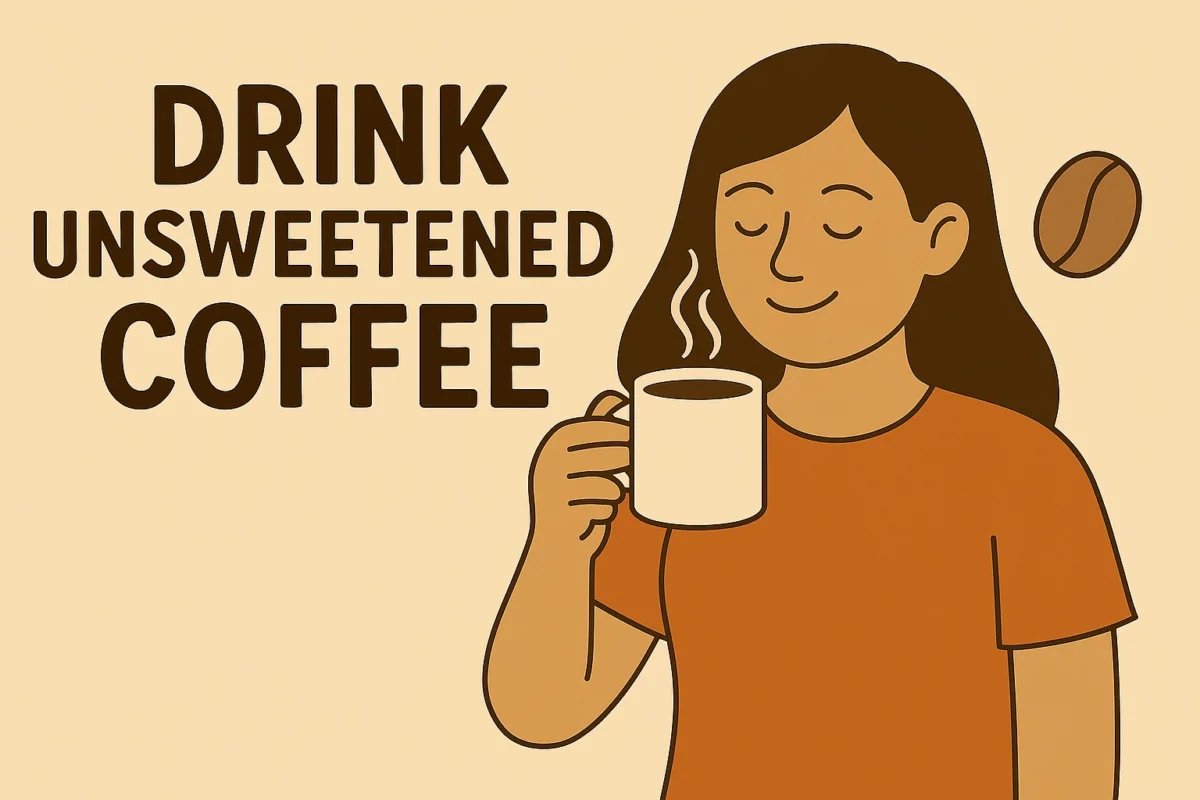
Black coffee is particularly effective because it’s virtually calorie-free while keeping you feeling satisfied between meals. Studies suggest that regular coffee consumption may help reduce your risk of type 2 diabetes, which is often linked to excess weight.
Pro tip: Replace sugary coffee drinks with black coffee to maximize weight loss benefits. If you’re new to black coffee, start with a single cup in the morning and gradually increase your intake over time.
8. Supplement With Glucomannan
Beyond coffee’s benefits, another powerful tool in your weight-loss arsenal is glucomannan, a natural dietary fiber supplement derived from the konjac plant. When integrated into your weight-management program alongside fiber-rich foods, this remarkable supplement can effectively support your fitness goals.
What makes glucomannan unique is its incredible water-absorption capability – just one capsule can transform a glass of water into gel. This action helps you feel fuller longer, slows down stomach emptying, and reduces the absorption of fats and proteins.
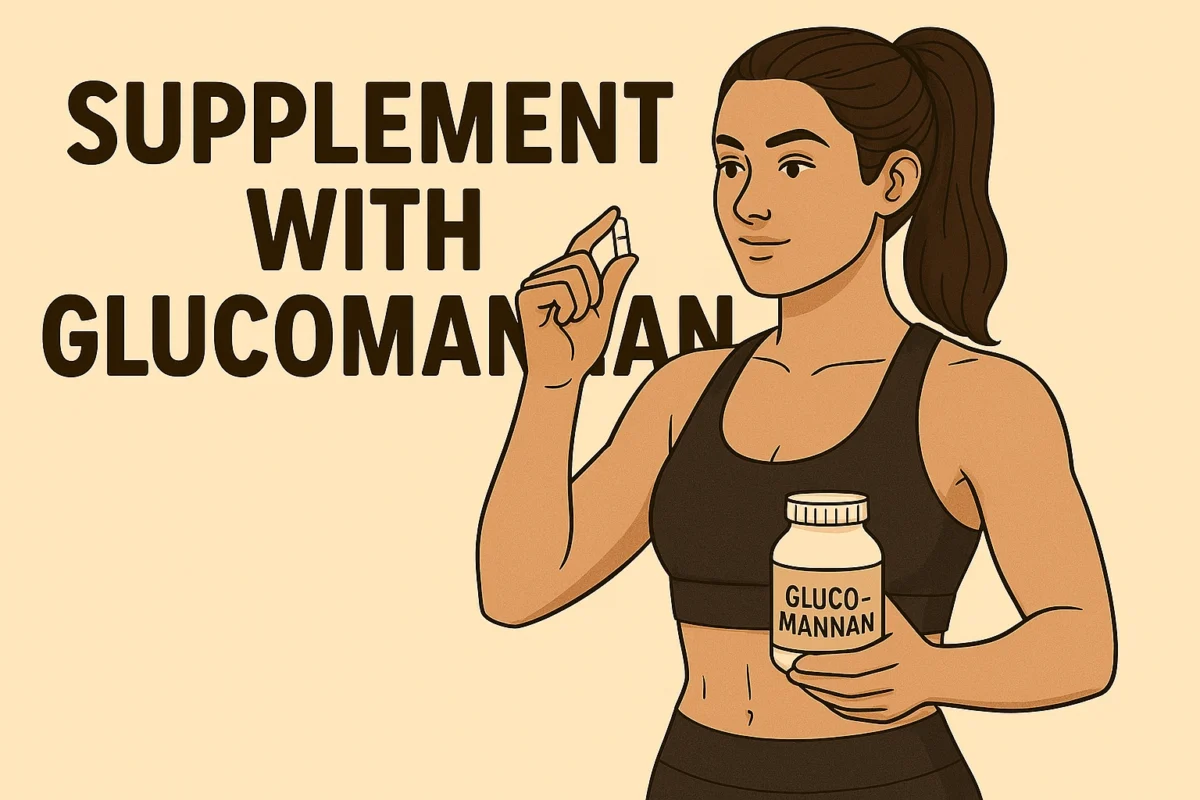
While it’s not a magic solution for rapid weight loss, such as extreme meal replacement plans or very low-calorie diets, it’s a science-backed supplement that can enhance your results.
Just remember to take it before meals with plenty of water to maximize its appetite-suppressing benefits.
9. Limit Liquid Calories
Many people overlook a major source of excess calories that can sabotage their weight loss efforts – sugary drinks. The liquid calories from soft drinks, fruit juices, energy drinks, and flavored milks can quickly derail your long-term weight management goals.
Research shows that consuming sugary beverages greatly increases your risk of obesity, type 2 diabetes, and cardiovascular disease. Unlike solid foods, these drinks don’t make you feel full, so you’re likely to consume more calories throughout the day.
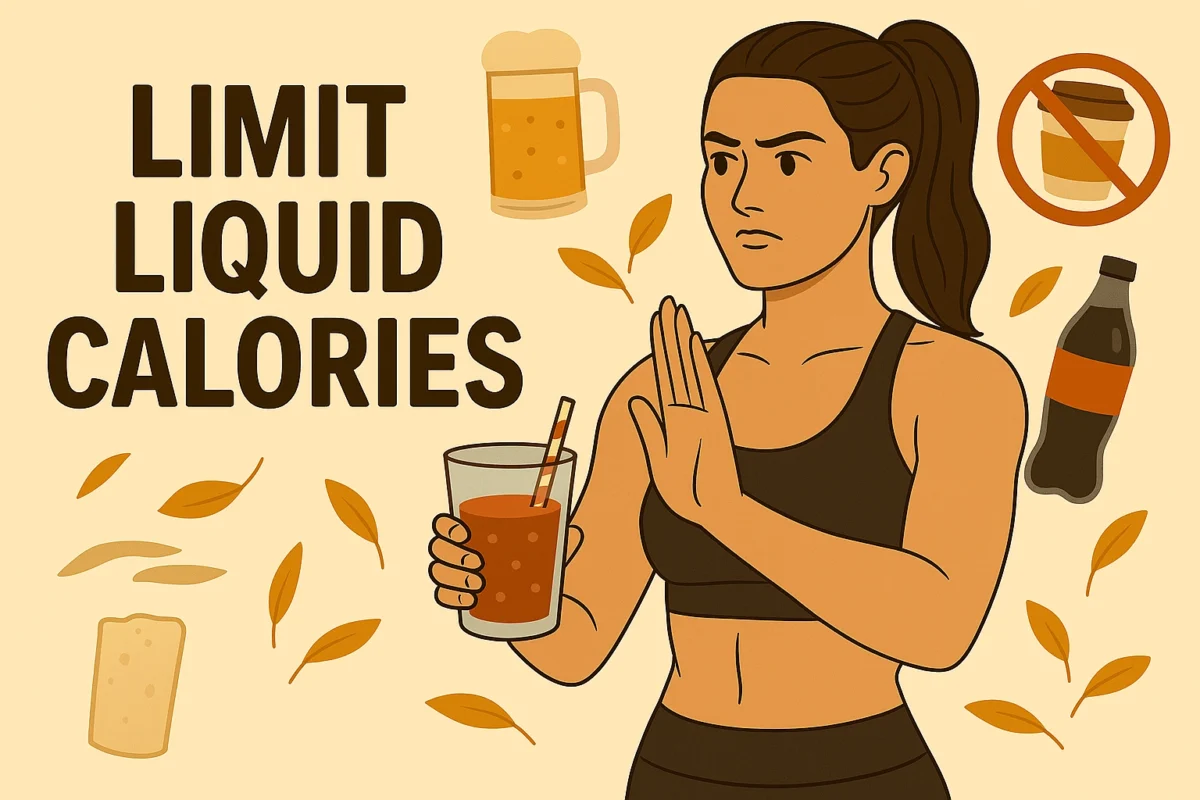
As any registered dietitian nutritionist will tell you, your best bet is to stick with water, unsweetened tea, or black coffee.
Remember Arnold’s famous quote: “Milk is for babies. When you grow up, you drink beer.” While Arnold was joking, he’s right about one thing – giving up sugary drinks is a grown-up decision for your health.
10. Limit Your Intake of Refined Carbs
Speaking of cutting back on sugary drinks, another key dietary change involves tackling refined carbohydrates.
When you’re reading weight-loss articles or researching the Mediterranean diet, you’ll often find warnings about refined carbs. These processed carbohydrates have been stripped of their beneficial nutrients and fiber, leaving only easily digested carbs that can lead to high blood pressure and weight gain.
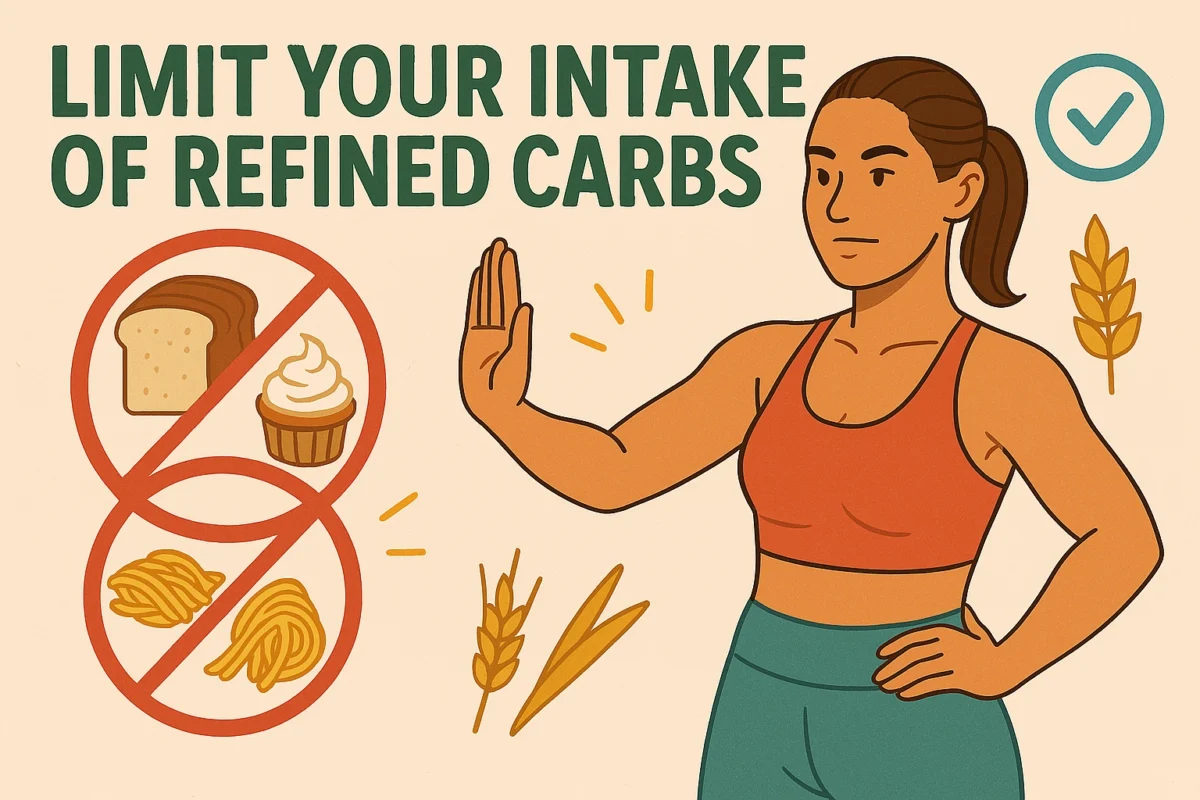
To protect your mental health and avoid potential obesity surgery down the road, limit your consumption of:
- White bread and flour
- Pastries and sweets
- Sugary breakfast cereals
- White rice
- Most packaged snacks
- Regular pasta
Replace these with whole-grain alternatives that retain their fiber and nutrients intact.
Your body will thank you with better energy levels and more sustainable weight loss results.
11. Fast Intermittently
While traditional dieting focuses on what you eat, intermittent fasting shifts attention to when you eat by creating structured periods of fasting and eating throughout the day.
When combined with lifestyle medicine approaches and behavioral weight management services, this method can support your weight loss goals.
Popular variations include the 16:8 method, where you eat within an 8-hour window, and the 5:2 approach, which restricts calories to two days a week.
For best results, pair intermittent fasting with a hypocaloric diet and track your progress using a food tracker or digital weight-loss programs.
Even Arnold, who traditionally advocated for multiple daily meals, has acknowledged the benefits of fasting when used strategically.
Before starting, especially if you’re taking GLP-1 meds, consult your healthcare provider to confirm this approach aligns with your medical needs and weight loss objectives.
12. Drink Unsweetened Green Tea
Anyone seeking a natural metabolism boost should consider green tea as their go-to beverage.
It’s packed with antioxidants that support your body’s fat-burning processes, making it an excellent addition to your weight management strategy.
For maximum health benefits, you’ll want to drink your green tea unsweetened.
Have 2-3 cups of water throughout the day, especially before workouts, to boost your metabolism.
If you’re looking for an even more powerful option, try matcha – it’s a concentrated form of green tea that delivers an extra punch of benefits.
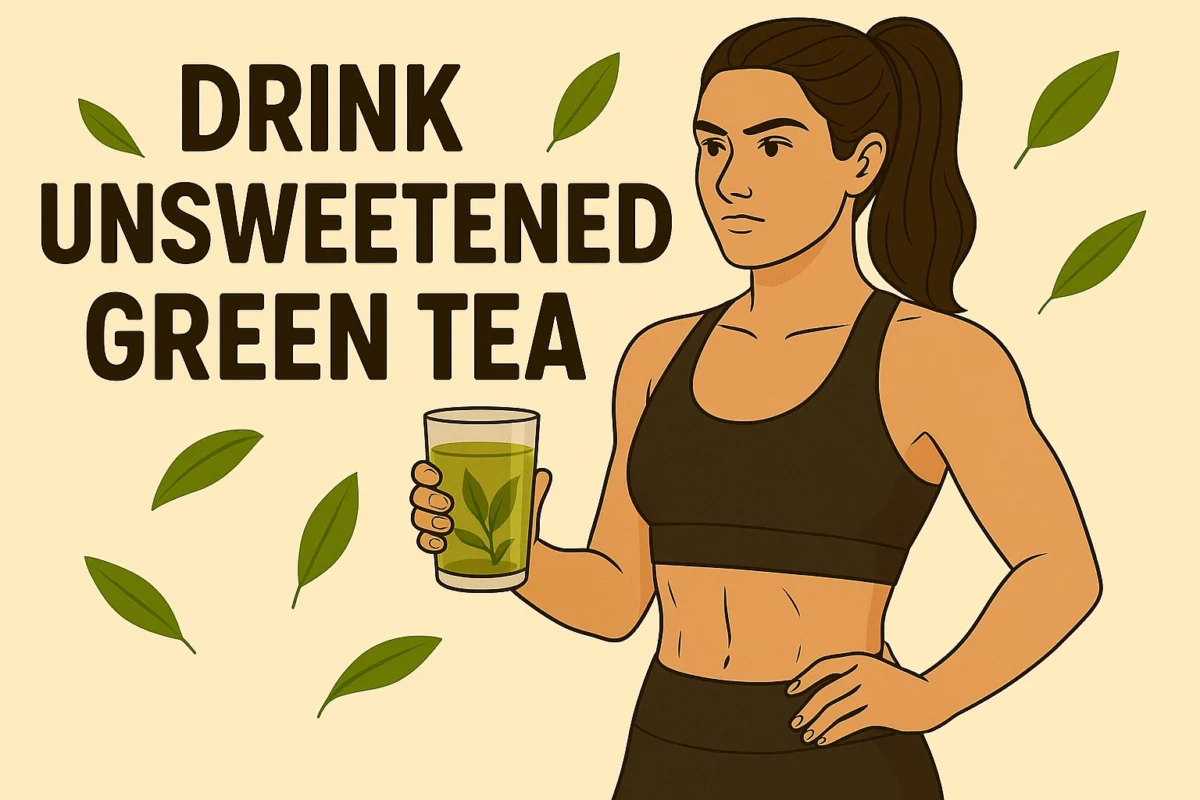
Remember Arnold’s famous saying about dedication? Well, it applies here too.
Make drinking green tea a daily habit, just like your workout routine.
Your body will thank you with improved energy levels and enhanced fat-burning potential.
13. Eat More Fruits and Vegetables
When it comes to sustainable weight loss, fruits and vegetables should be the foundation of your diet.
These weight-loss-friendly foods are packed with water, nutrients, and fiber while maintaining a very low energy density. This means you’ll feel full and satisfied without consuming excessive calories.
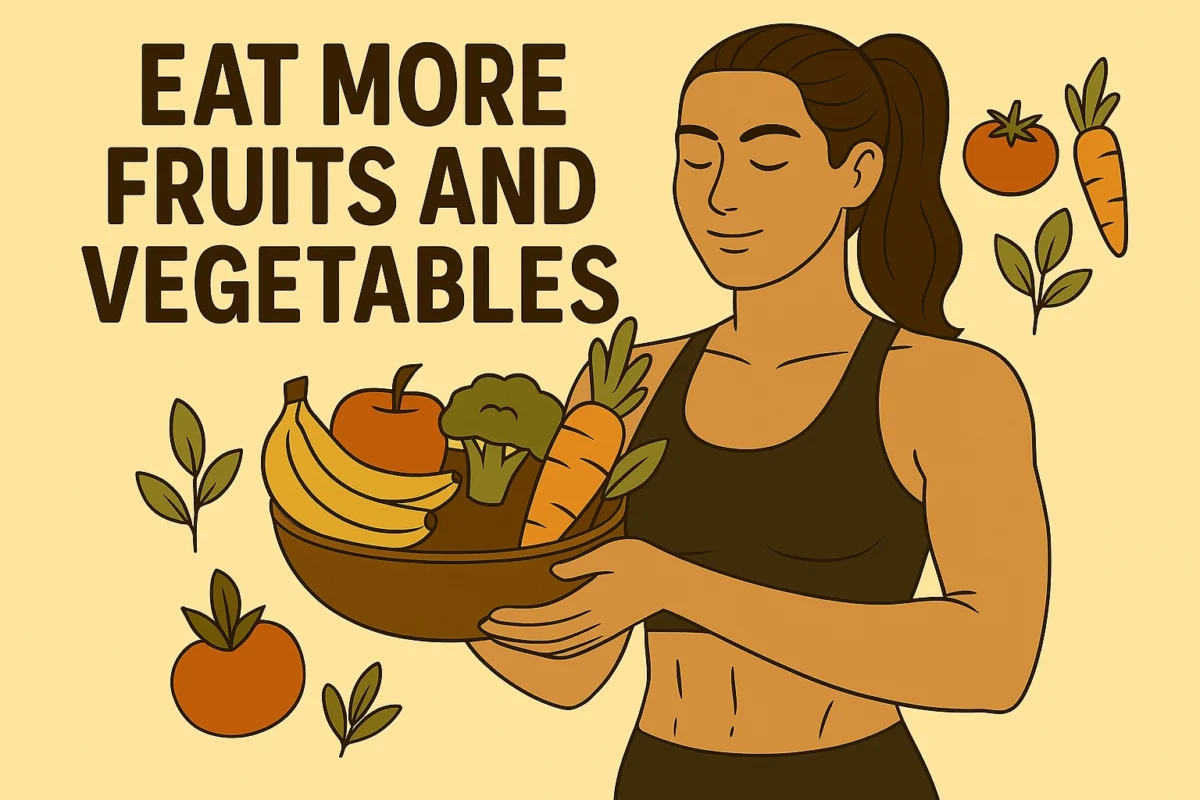
You can significantly enhance your healthy activity and weight loss results by increasing your daily intake of fruits and vegetables. Studies referenced by Obesity UK confirm that people who eat more fruits and vegetables tend to lose more weight consistently.
Here’s why they work so well:
- High water content keeps you hydrated
- Rich fiber content promotes fullness
- Low calorie density allows larger portions
- Natural nutrients support metabolism
- Versatile options for every meal and snack
Make these nutritious powerhouses the stars of your plate, and you’ll see better results.
14. Count Calories Once in a While
Although you don’t need to track every bite, counting calories periodically can help you stay on track with your weight loss goals.
Start by keeping a food diary for just one week each month to understand your eating patterns and identify triggers for food cravings.
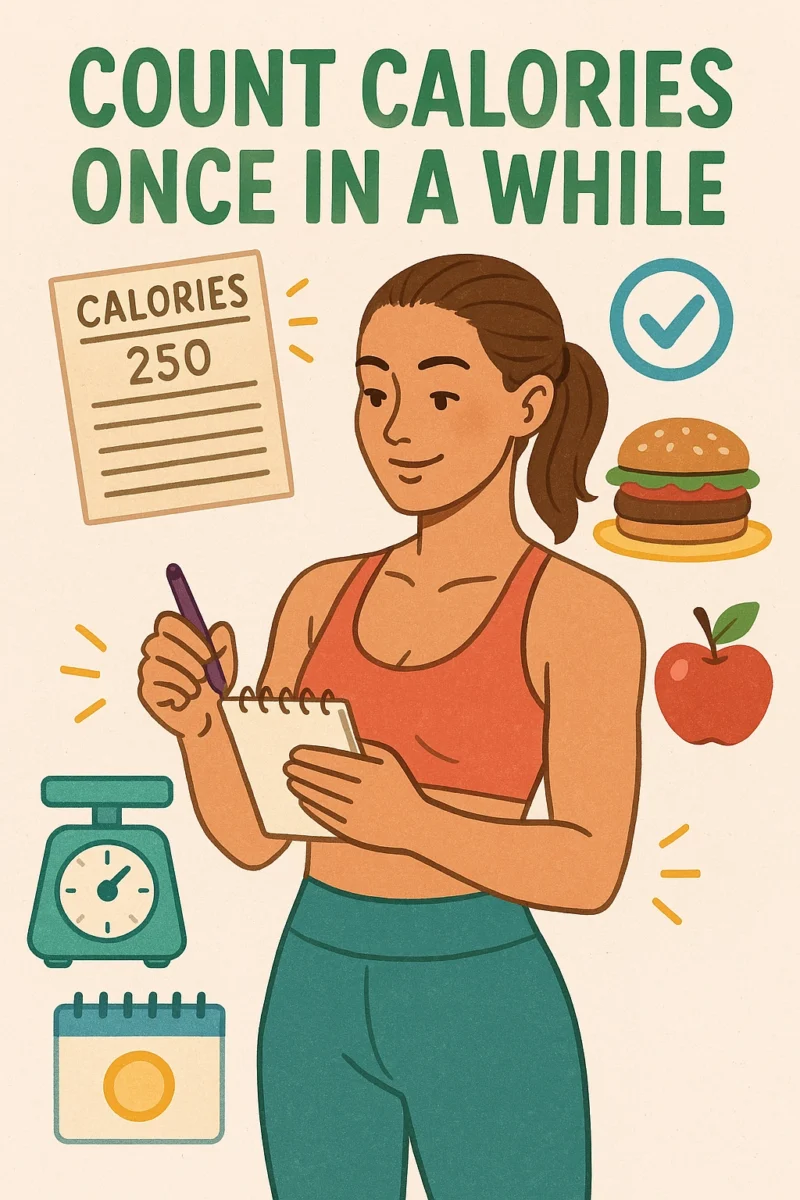
You can make this process easier by using a weight tracker app on your phone, which often includes features for both meal logging and exercise journal entries.
These tools help you monitor your healthy activity levels alongside your food intake.
15. Use Smaller Plates
A simple change to your dinnerware can significantly impact portion control.
Unlike strict regimens like the paleo diet, which focus on food textures, using smaller plates is an effortless way to manage your portions and prevent weight cycling. Research suggests this simple strategy can influence how much you eat, ultimately affecting your body mass index.
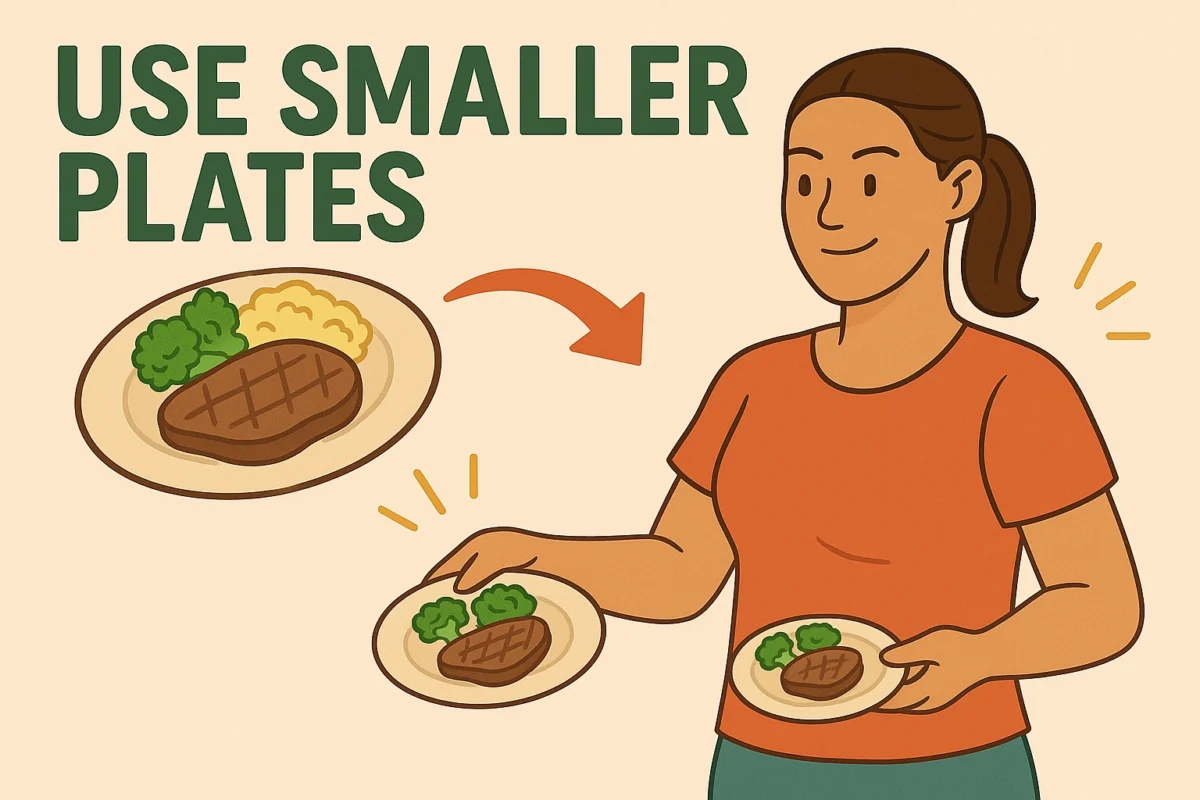
To maximize results while maintaining moderate intensity activity in your fitness routine:
- Choose plates that are 9-10 inches in diameter
- Use portion control dishes with marked sections
- Stick to this approach during all meals at home
This technique complements other long-term strategies for treating obesity without requiring significant lifestyle changes.
16. Try a Low-Carb Diet
While portion control helps manage calories, modifying your food choices can supercharge your weight loss journey. A low-carb diet is a proven strategy that has helped countless people achieve their body image goals and reduce their body fat percentage effectively.
When you limit carbohydrates and increase your protein and healthy fat intake, you’ll naturally eat fewer calories because these foods keep you feeling fuller longer. Studies show that following a low-carb diet can be more effective for weight loss than traditional low-fat approaches.
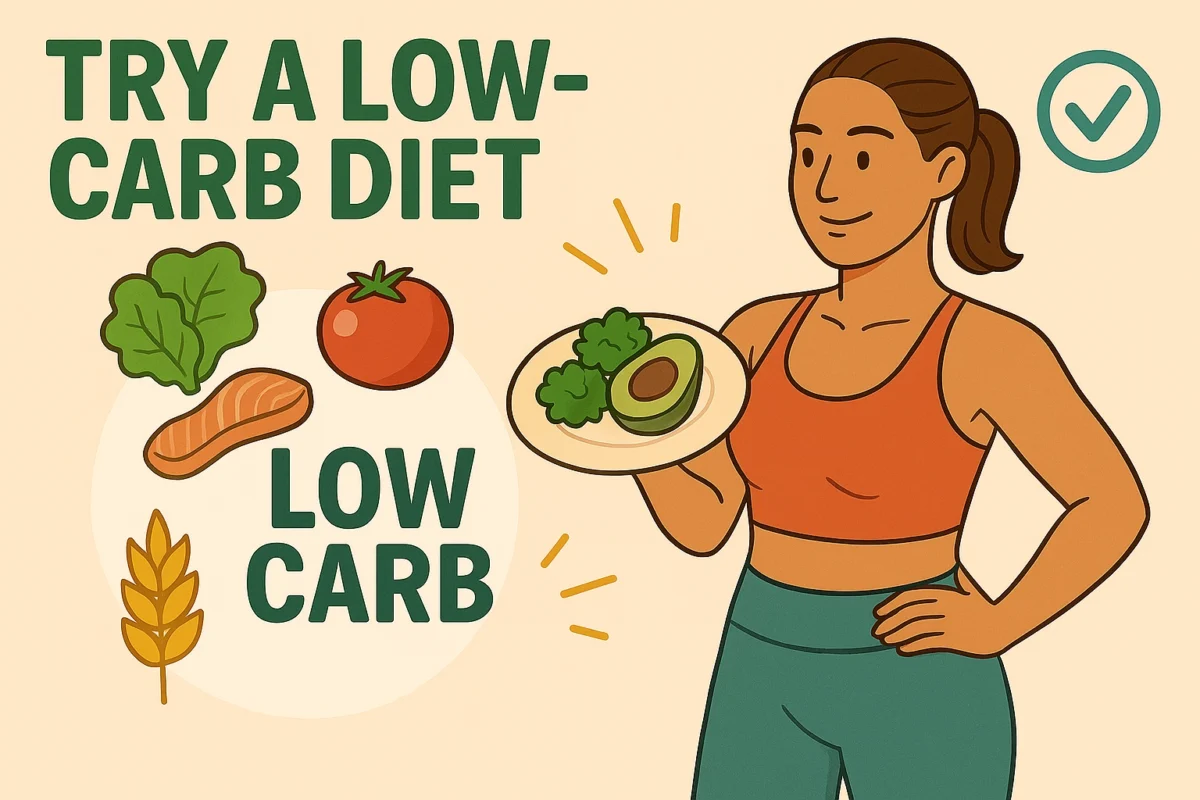
Additionally, adopting a healthy diet in this manner may help lower your risk of cardiovascular disease.
To get started, focus on filling your plate with lean proteins, vegetables, and healthy fats while reducing bread, pasta, and foods high in sugar. Track your progress and adjust your carb intake based on your body’s response.
17. Eat More Slowly
Because eating too quickly prevents your body from recognizing fullness signals, mastering the art of slower eating can be a transformative factor for your weight loss journey.
When you eat slowly, you’re more likely to maintain stable blood sugar levels and prevent excess weight gain.
Here’s how to incorporate slower eating into your weight management services plan:
- Put your fork down between bites
- Chew each mouthful 20-30 times
- Take small sips of water while eating
- Use a physical activity diary to track meal duration
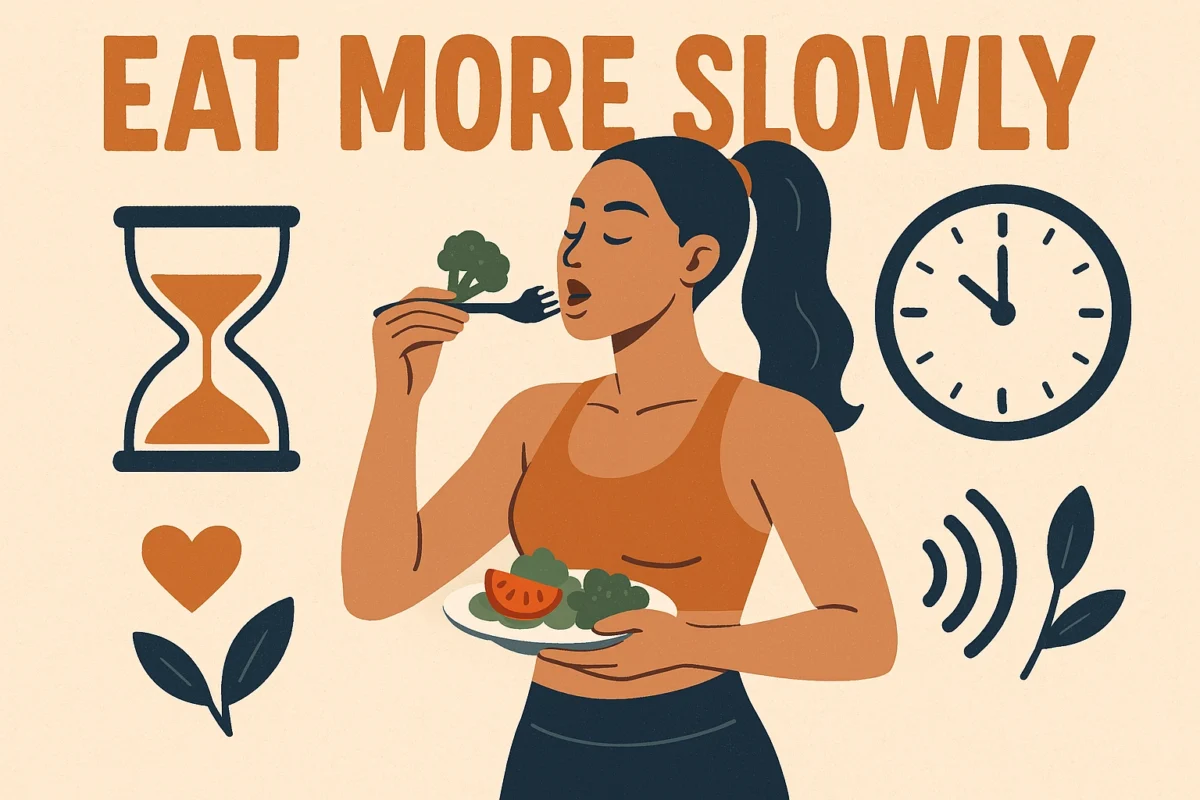
This technique is beneficial when eating healthy when dining out. Just as Arnold emphasizes proper form during strength exercises, focusing on deliberate eating movements helps your body process food more efficiently.
Research shows that slow eaters typically consume fewer calories and produce more weight-loss hormones than those who rush through meals.
18. Add Eggs to Your Diet
Since protein-rich foods form the cornerstone of effective weight loss, adding eggs to your daily meal plan can supercharge your results through their unique combination of nutrients.
You’ll find that eggs pack a powerful protein punch while being surprisingly low in calories, making them an ideal choice for any weight loss journey. When you incorporate eggs into your meals, they’ll help control your appetite and keep you feeling fuller for longer. Natural appetite suppression can notably reduce your overall caloric intake throughout the day.
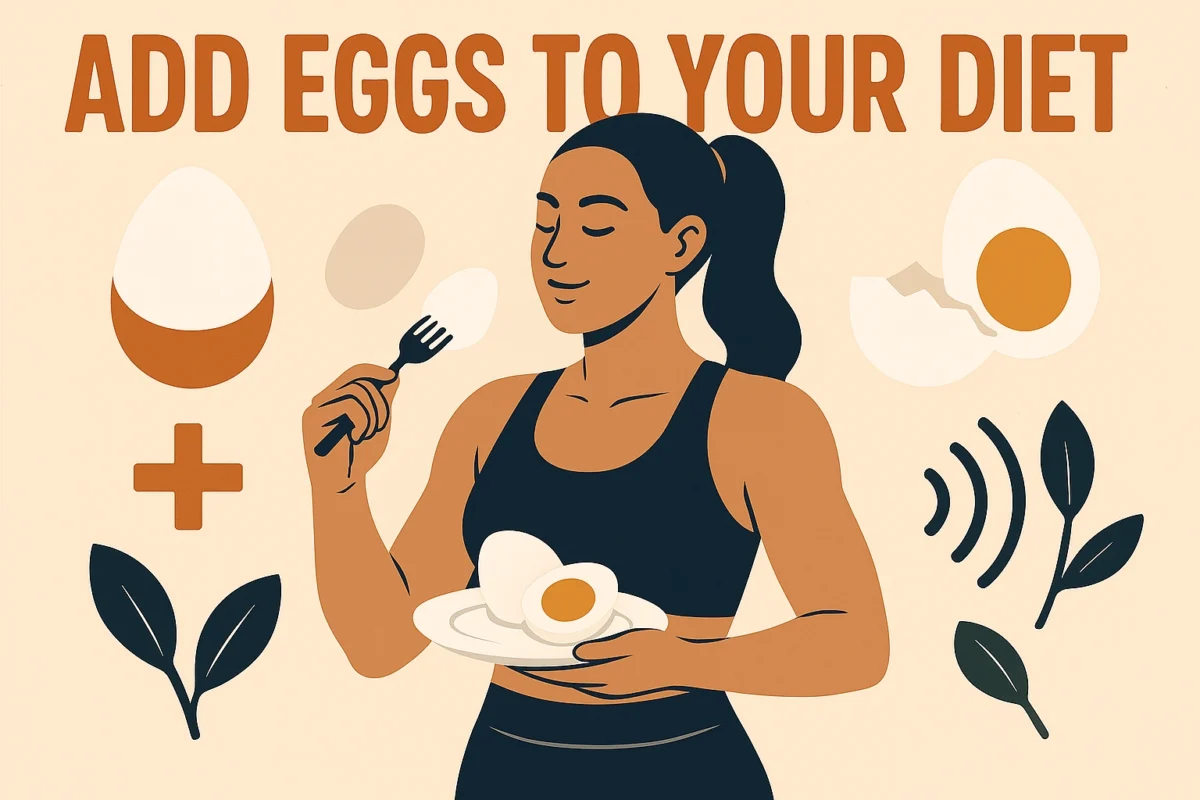
As Arnold always says, “The egg is perfect protein,” – and he’s right. Make eggs part of your healthy activity routine by having them at breakfast or adding them to your post-workout meals.
They’re versatile, affordable, and will support your body’s needs while helping you achieve your weight loss goals.
19. Spice up Your Meals
Adding spices to your meals can be just as effective for weight loss as incorporating protein-rich foods, such as eggs.
When you add chili peppers and jalapeños to your Mediterranean-style diet, you’re getting more than just flavor – you’re harnessing the power of capsaicin. This natural compound helps boost your metabolism and reduce body fat.
You don’t need fancy exercise facilities to start burning more calories; simply spicing up your meals can help decrease your appetite and naturally lower your calorie intake.
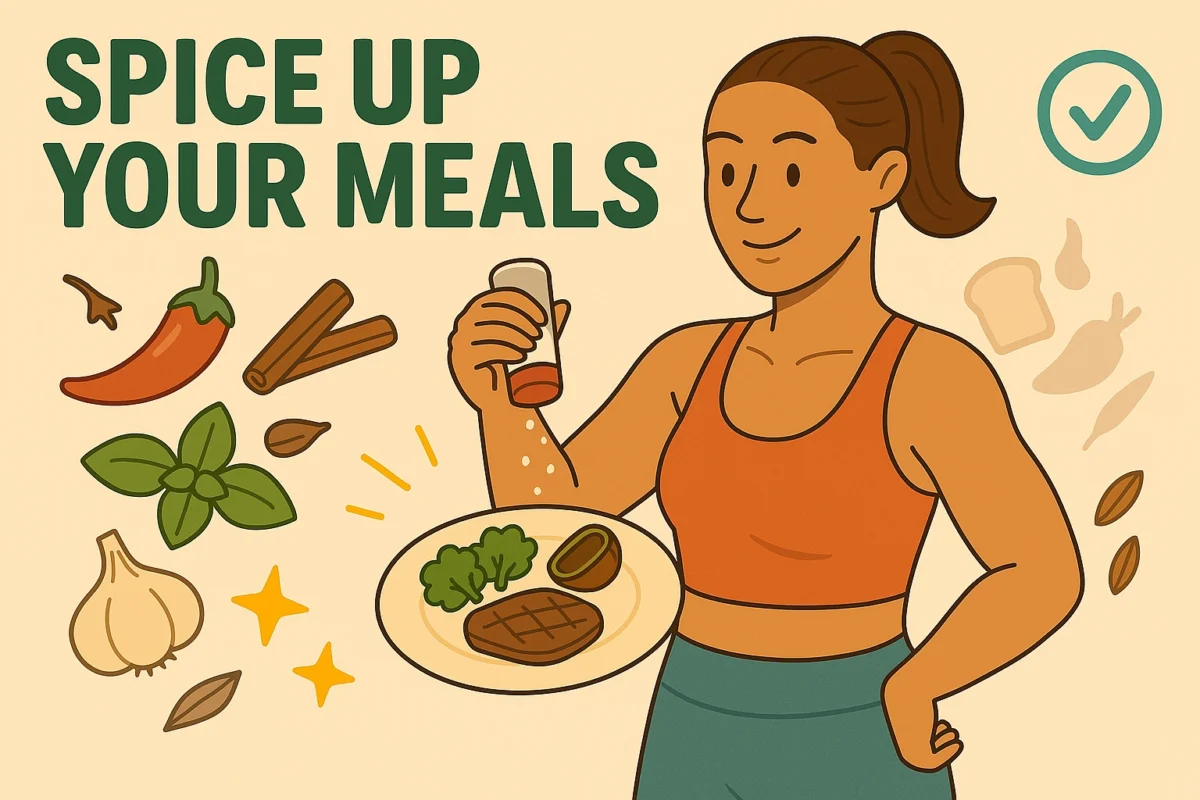
Try adding diced jalapeños to your morning eggs, sprinkling red pepper flakes on your lunch salad, or incorporating chili peppers into your dinner recipes.
Even Arnold knows that small changes, such as adding metabolism-boosting spices, can make a significant difference in your fitness journey.
20. Take Probiotics
Your gut health plays a crucial role in weight management, which is why incorporating probiotics into your fitness strategy is essential.
These beneficial bacteria help regulate your digestive system and support healthy weight loss through multiple mechanisms.
Probiotics work in several ways to support your fitness goals:
- They help maintain a healthy gut bacteria balance
- They reduce inflammation throughout your body
- They assist in regulating your appetite
- They can block some dietary fat absorption
You’ll find probiotics in fermented foods like yogurt, kefir, and kimchi.
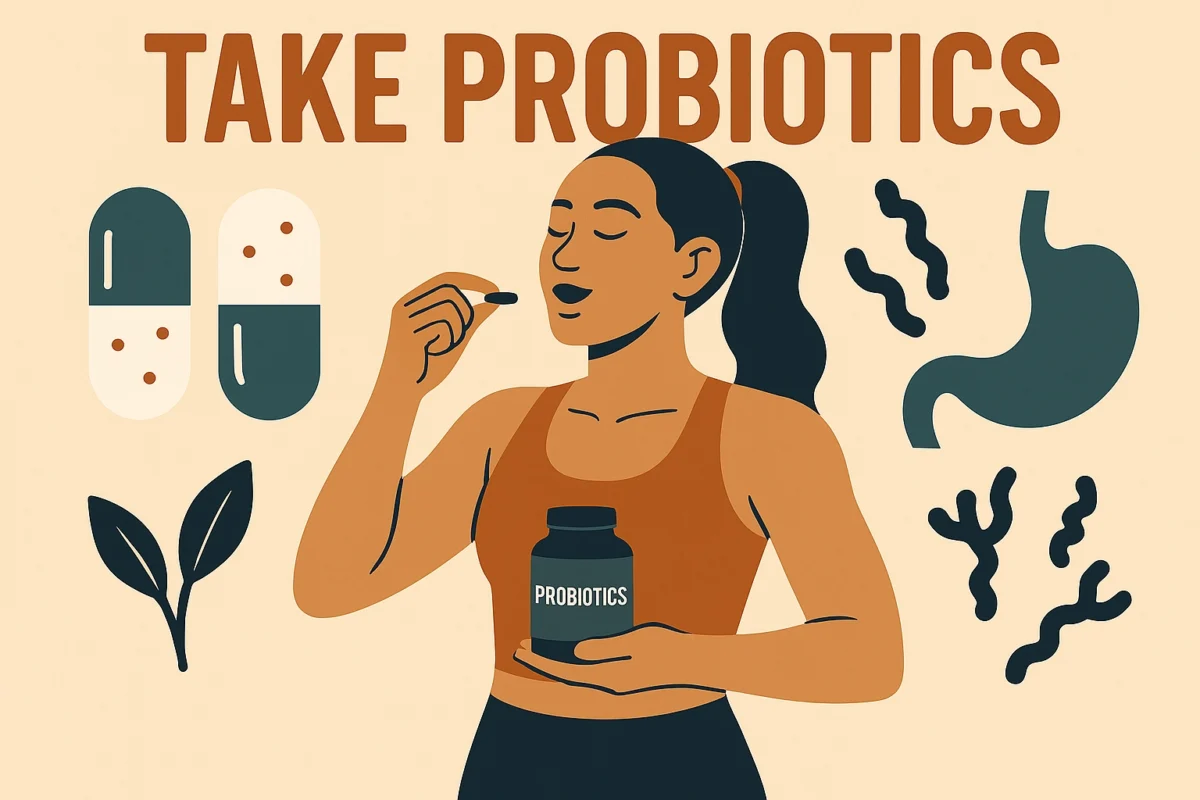
If you’re not getting enough through diet alone, consider a high-quality supplement.
Just as Arnold Schwarzenegger’s famous saying, “Take care of your body – it’s the only place you have to live,” suggests, taking care of your gut health through probiotics can significantly impact your weight loss journey.
21. Get Enough Sleep
Sleep plays a crucial role in achieving successful weight loss, influencing factors such as metabolism and food choices. When you’re sleep-deprived, your body’s hunger hormones become disrupted, leading you to crave high-carb, fatty foods that can derail your weight loss efforts.
Even if you’re following the Mayo Clinic diet and engaging in regular aerobic exercise, a lack of sleep can sabotage your progress.
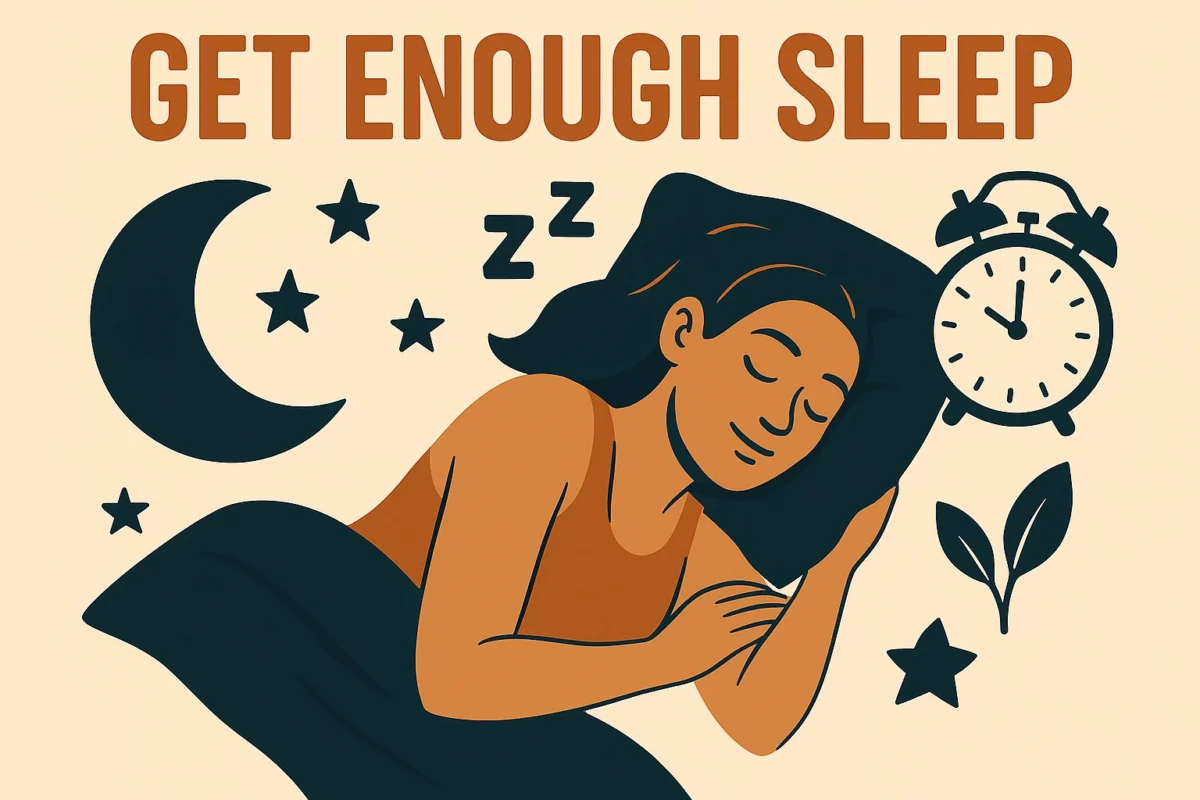
Research shows that poor sleep patterns increase your risk of heart disease and elevated blood pressure. To optimize your weight loss journey:
- Aim for 7-9 hours of quality sleep each night
- Maintain a consistent sleep schedule
- Create a dark, quiet sleeping environment
- Avoid screens before bedtime
- Check your blood pressure regularly to monitor sleep’s impact on your health
22. Eat More Fiber
Beyond getting proper rest, incorporating fiber-rich foods into your daily meals can supercharge your weight loss journey.
Much like Arnold’s dedication to precision in training, you’ll want to strategically increase your fiber intake to help control appetite and support healthy gut bacteria.
Water-soluble fiber is particularly effective as it helps you feel fuller longer and slows down stomach emptying. This natural approach aligns perfectly with a Mediterranean eating style while supporting your body’s set point weight.
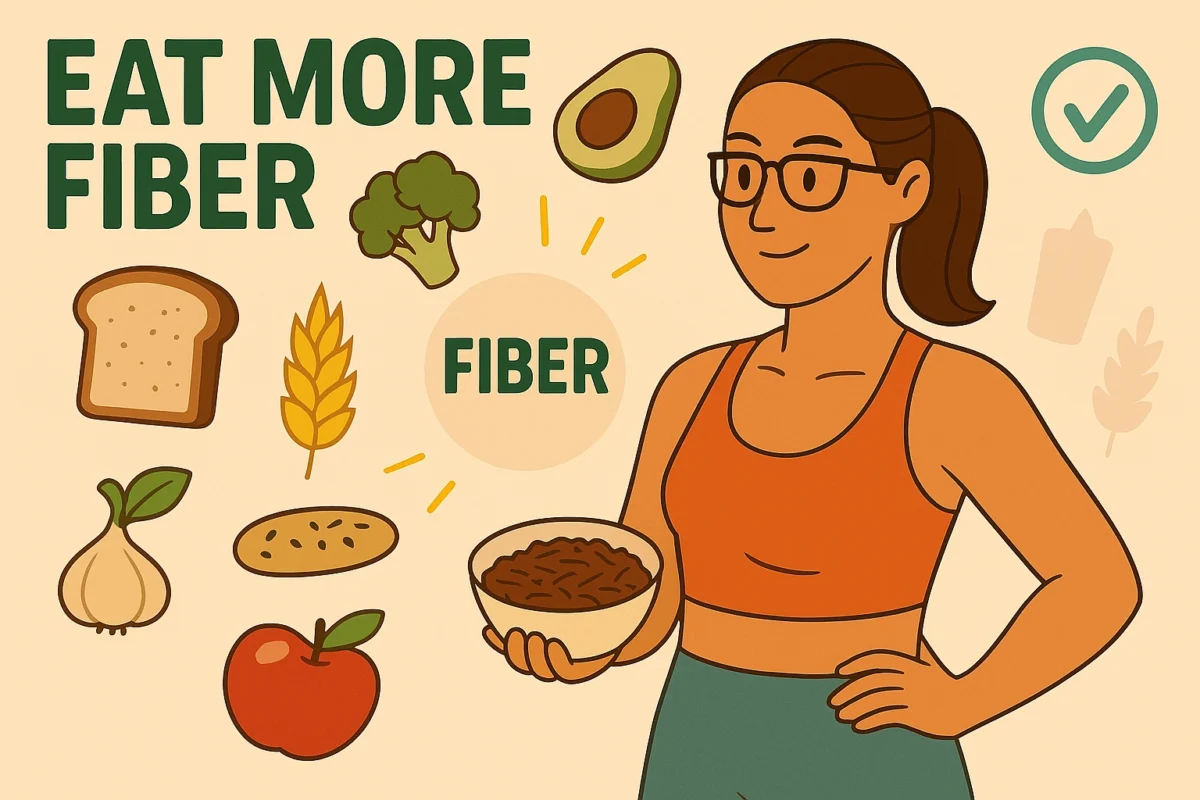
When combined with resistance exercise, fiber becomes an even more powerful ally in your transformation.
Start gradually to avoid digestive discomfort:
- Add one fiber-rich food per meal
- Drink plenty of water throughout the day
- Monitor your body’s response and adjust accordingly
- Aim for a mix of soluble and insoluble fiber sources
23. Brush Your Teeth After Meals
Anyone serious about weight loss knows it’s not just about what goes into your mouth – it’s also about what you do after eating.
While resources for healthy activities, such as brisk walking and weight machines, help prevent coronary heart disease, don’t underestimate the power of dental hygiene in your weight loss journey.
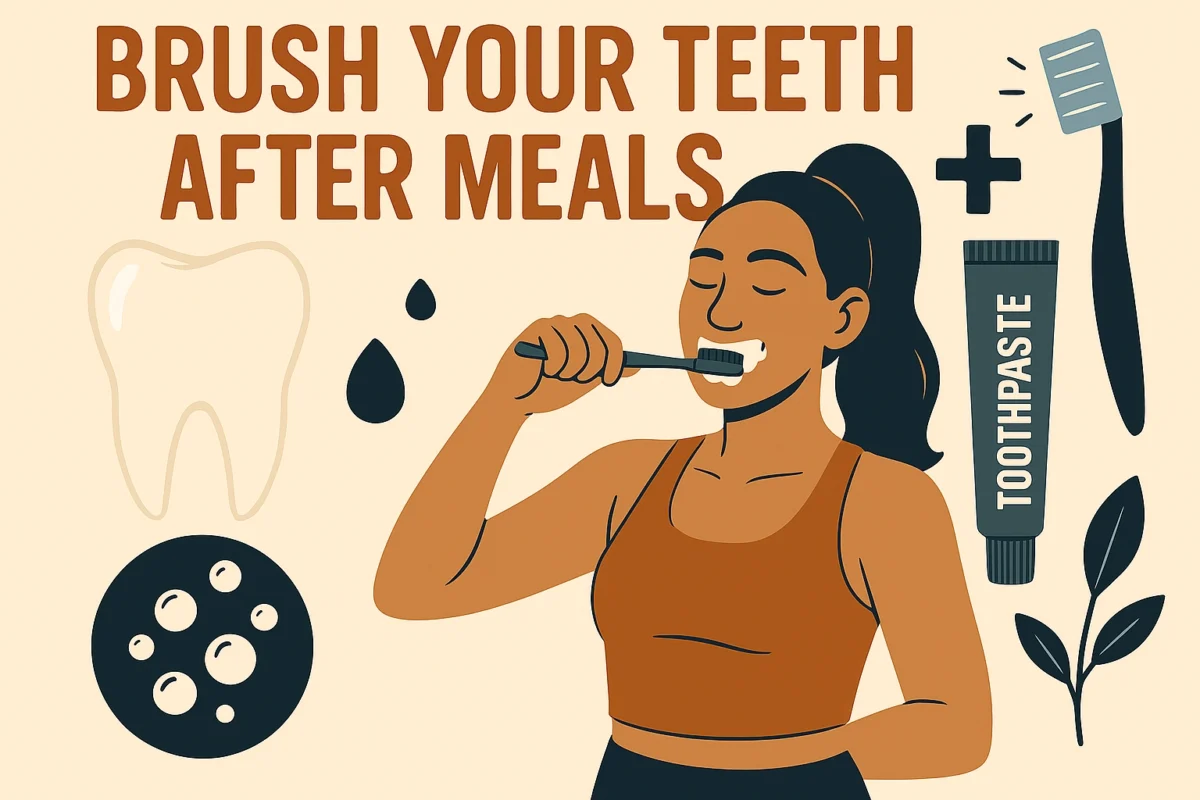
Brushing your teeth after meals can be a significant factor for weight control. The minty taste of toothpaste and mouthwash temporarily alters your sense of taste, making food less appealing and reducing the urge to snack between meals.
Even Arnold, known for his disciplined approach, incorporates post-meal brushing into his routine. This simple habit, recommended by NHS weight management services, creates a psychological barrier that helps you stick to your planned meals and avoid mindless eating.
24. Work to Overcome Food Addiction
While good dental habits can help control snacking, addressing food addiction requires a deeper understanding of your relationship with eating.
If you’re struggling with overeating, especially with processed foods, you’re not alone – nearly 20% of people face similar challenges.
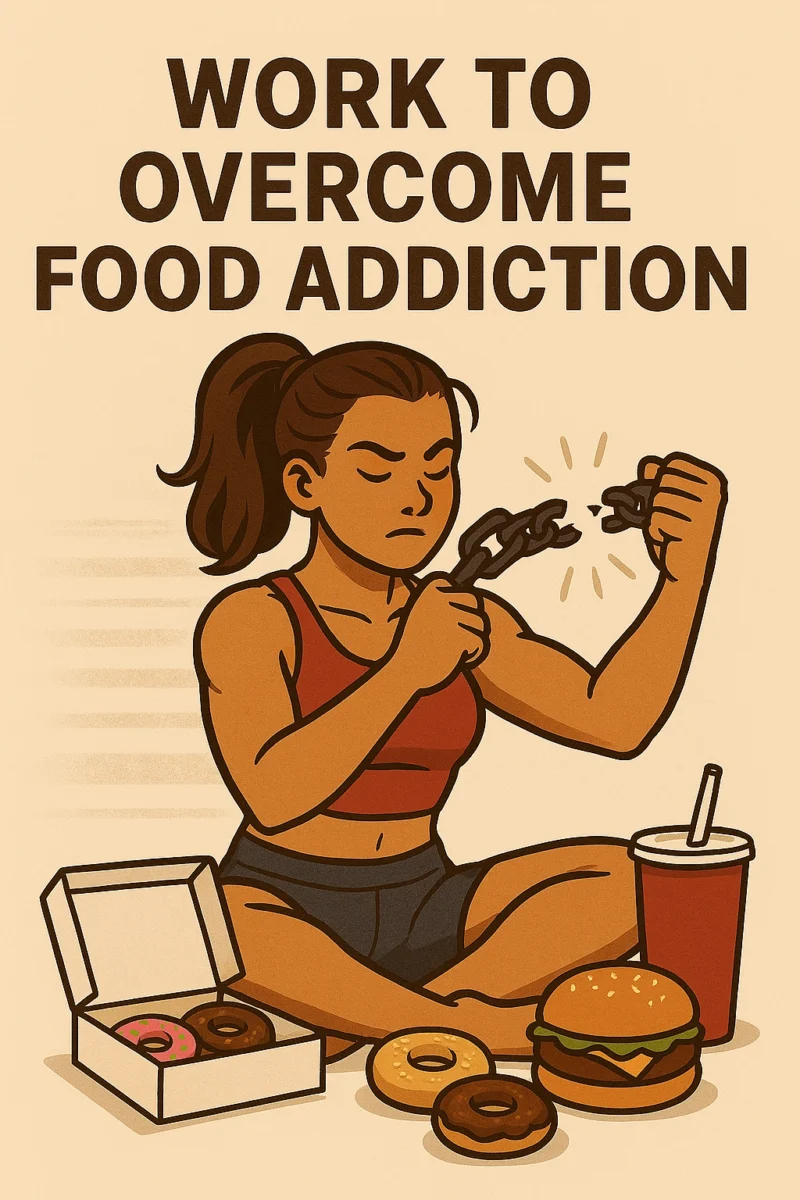
To overcome food addiction and support your weight loss goals:
- Identify trigger foods that cause overwhelming cravings
- Remove highly processed, sugary, and fatty foods from your home
- Keep a food diary to track emotional eating patterns
- Replace junk foods with whole, unprocessed alternatives
- Develop stress management techniques
- Consider working with a healthcare professional who specializes in food addiction
Managing Stress Levels
Managing stress levels is crucial for achieving and maintaining a healthy weight. Chronic stress can make weight loss difficult. It can cause emotional eating and disrupt sleep patterns. This section examines the impact of stress on weight and provides practical techniques for stress reduction.
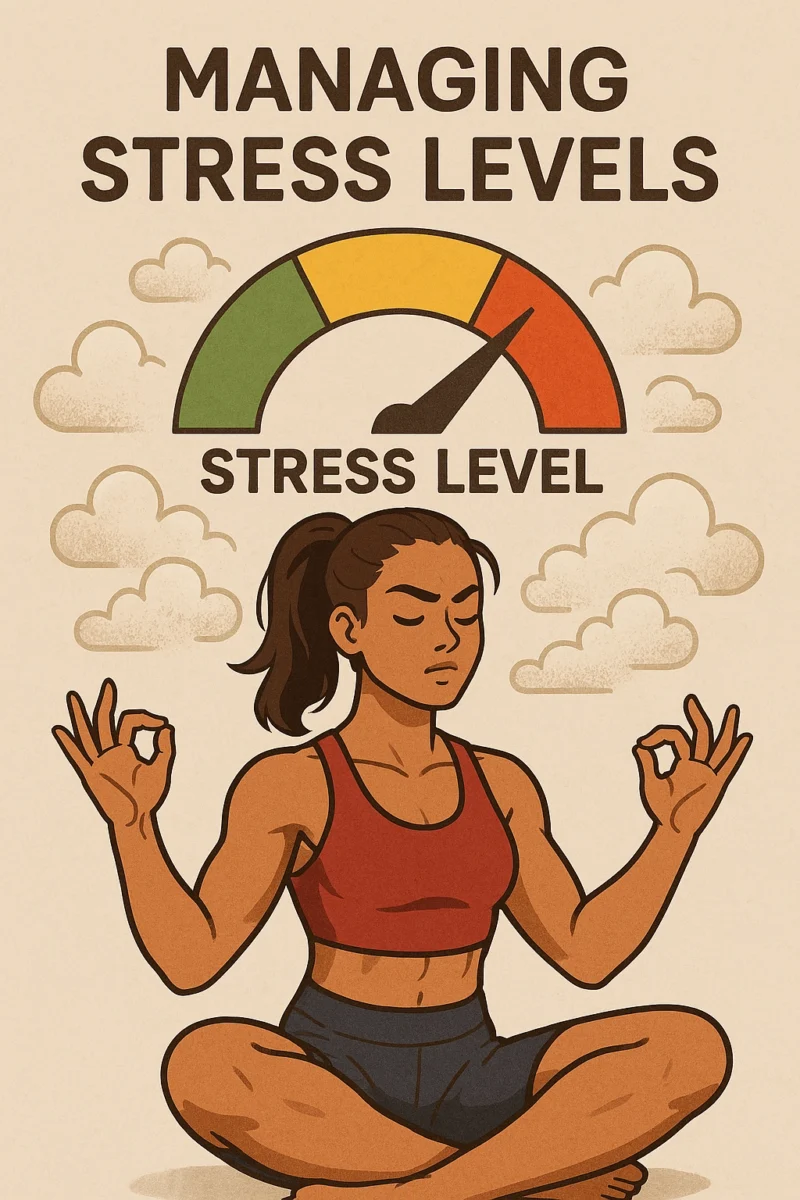
Effects Of Stress On Weight
Stress triggers the release of cortisol, a hormone that increases appetite. High cortisol levels lead to cravings for high-calorie foods. This can cause weight gain over time. Stress also affects sleep, and poor sleep can disrupt the hormones that regulate hunger.
When you’re stressed, you may turn to food for comfort. Emotional eating often involves unhealthy snacks. These extra calories can add up quickly. Over time, this can lead to significant weight gain.
| Effect | Description |
| Increased Appetite | Cortisol makes you feel hungrier. |
| Cravings | Stress leads to cravings for sugary and fatty foods. |
| Emotional Eating | Using food to cope with stress. |
| Sleep Disruption | Poor sleep affects hunger hormones. |
Stress Reduction Techniques
There are several ways to reduce stress and improve weight loss. Here are some effective techniques:
- Exercise: Physical activity boosts mood and reduces stress hormones.
- Mindfulness: Practices such as meditation and yoga can help calm the mind.
- Sleep: Aim for 7-8 hours of quality sleep each night.
- Healthy Eating: Consuming nutrient-rich foods can help improve your mood and energy levels.
- Hobbies: Engaging in activities you enjoy can lower stress levels.
- Social Support: Spend time with friends and family to feel connected.
Incorporating these stress reduction techniques can help manage weight. Reducing stress can help maintain healthy habits more easily. This can lead to more successful and sustainable weight loss.
Smart Snacking For Weight Loss
Snacking doesn’t have to sabotage your weight loss journey. With wise choices, snacks can help you lose weight safely without intermittent fasting. Let’s explore some smart snacking tips to keep you on track.
Healthy Snack Ideas
Choosing healthy snacks can be easy and fun. Here are some ideas:
- Fresh Fruits: Apples, bananas, berries, and oranges are great options.
- Vegetable Sticks: Carrots, celery, cucumber, and bell peppers with hummus.
- Yogurt: Low-fat yogurt with a sprinkle of nuts or seeds.
- Nuts and Seeds: Almonds, walnuts, sunflower seeds, and pumpkin seeds.
- Whole Grain Crackers: Pair with a small piece of cheese.
Avoiding Common Snacking Pitfalls
Many people make mistakes while snacking. Here are some tips to avoid common pitfalls:
- Portion Control: Use small bowls or containers to prevent overeating.
- Avoid Processed Snacks: Skip chips, cookies, and sugary treats.
- Read Labels: Check for hidden sugars and unhealthy fats.
- Stay Hydrated: Drink water before reaching for a snack. Sometimes thirst is mistaken for hunger.
- Mindful Eating: Avoid eating while watching TV or working.
By following these tips, you can enjoy snacks that support your weight loss goals. Make every snack a step towards a healthier you.
To achieve permanent weight loss, it’s essential to abandon very low-calorie diets, as they only provide temporary results. Instead, adopt sustainable approaches that avoid the feeling of starvation. Here are eight techniques for effective weight management without deprivation:
- Balanced Nutrition: Emphasize a balanced diet with a sufficient intake of essential nutrients.
- Regular Exercise: Incorporate consistent physical activity.
- Healthy Habits: Develop long-term healthy eating habits.
- Portion Control: Practice mindful eating and portion control.
- Hydration: Drink plenty of water.
- Sleep: Ensure sufficient and quality sleep.
- Stress Management: Manage stress effectively.
- Support System: Seek support from friends, family, or professionals.
These strategies help maintain weight loss without feeling deprived.
Tracking Progress Without Obsession
Many people find it hard to track their weight loss progress without becoming obsessed. It is essential to monitor progress healthily. This helps in staying motivated and achieving long-term goals.
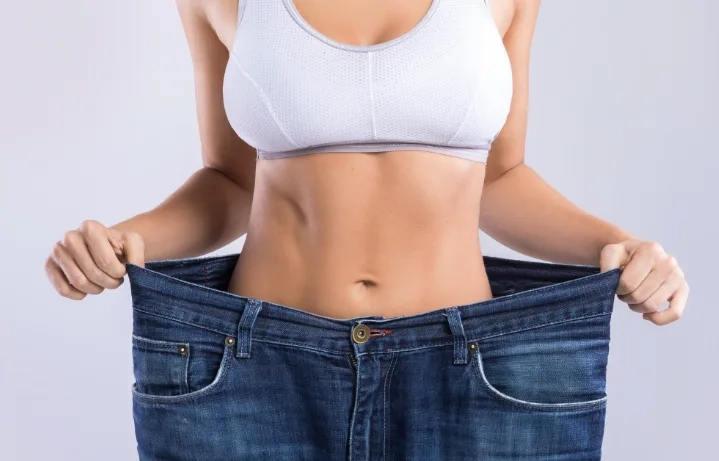
Setting Achievable Goals
Set goals that are realistic and attainable. Small, achievable goals can help you stay on track. For instance, aim to lose 1 to 2 pounds per week. This is a safe and manageable target.
Use a journal or a dedicated goal-tracking app to keep track of your objectives. Write down your daily and weekly targets. Review your progress regularly to stay motivated and on track.
Healthy Ways To Monitor Weight Loss
Use different methods to track your progress. Do not rely solely on the scale. The scale can be misleading sometimes. Consider these methods:
- Measure your body with a tape measure. Track changes in your waist, hips, and thighs.
- Take progress photos every week. Compare these photos over time.
- Keep a food diary. Note what you eat and how you feel.
- Track your physical activity. Record your workouts and daily steps.
| Method | Benefit |
| Tape Measure | Shows changes in body size |
| Progress Photos | Visual comparison over time |
| Food Diary | Helps identify eating patterns |
| Activity Tracker | Encourages consistent exercise |
Remember to celebrate your small victories. Reward yourself when you reach a milestone. This will keep you motivated and on track.
To Wrap It All Up
You’ve learned powerful strategies for sustainable weight loss without relying on intermittent fasting. Research shows that people who focus on whole foods and protein-rich meals lose 65% more weight than those following restrictive diets alone.
By implementing these science-backed methods—such as mindful eating and proper sleep hygiene—you’re setting yourself up for long-term success. Remember, consistent small changes lead to significant results, just as Arnold says: “The last three or four reps are what makes the muscle grow.”
FAQs
How Much Weight Can You Safely Lose in a Week?
Safely lose 1-2 pounds (0.45-0.9 kg) per week. This rate maintains muscle mass, supports steady fat loss, and reduces health risks. Faster weight loss increases risks of muscle loss, nutrient deficiencies, and gallstones. Aim for a daily calorie deficit of 500-1000 calories to achieve this safe weight loss range.
Is Rapid Weight Loss Safe?
Rapid weight loss is generally unsafe. Losing more than 2 pounds (0.9 kg) per week increases risks of muscle loss, gallstones, dehydration, and nutritional deficiencies. Safe weight loss involves gradual calorie reduction, balanced nutrition, and regular strength training to maintain muscle and metabolic health.
How to Lose Weight Without Losing Muscle?
Lose weight without losing muscle by eating sufficient protein (1.6-2.2 g/kg body weight), maintaining a moderate calorie deficit, and strength training at least 3 times per week. Protein preserves muscle mass, while resistance training signals your body to retain muscle during fat loss.
Can You Lose Weight Safely Without Exercise?
You can lose weight safely without exercise by reducing calorie intake through portion control and eating nutrient-dense foods. However, combining diet with exercise preserves muscle mass, boosts metabolism, and improves long-term weight maintenance. Diet-only weight loss risks higher muscle loss over time.
How to Lose Weight Without Damaging Your Metabolism?
Lose weight without damaging your metabolism by eating enough protein, avoiding severe calorie restriction, and including resistance training. Aim for a calorie deficit of no more than 20-25% below maintenance. Crash diets slow metabolism and increase muscle loss, making future weight management harder.





